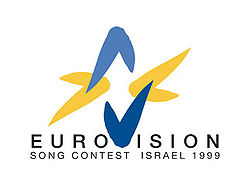| Eurovision Song Contest 1999 | |
|---|---|
 | |
| Dates | |
| Final | 29 May 1999 |
| Host | |
| Venue | International Convention Centre Jerusalem, Israel |
| Presenter(s) | |
| Directed by | Hagai Mautner |
| Executive supervisor | Christine Marchal-Ortiz |
| Executive producer | Amnon Barkai |
| Host broadcaster | Israel Broadcasting Authority (IBA) |
| Website | eurovision |
| Participants | |
| Number of entries | 23 |
| Debuting countries | None |
| Returning countries | |
| Non-returning countries | |
| |
| Vote | |
| Voting system | Each country awarded 12, 10, 8–1 points to their ten favourite songs |
| Winning song | |
The Eurovision Song Contest 1999 was the 44th edition of the Eurovision Song Contest, held on 29 May 1999 at the International Convention Centre in Jerusalem, Israel. Organised by the European Broadcasting Union (EBU) and host broadcaster Israel Broadcasting Authority (IBA), the contest was held in the country following its victory at the 1998 contest with the song "Diva" by Dana International, and was presented by Dafna Dekel, Yigal Ravid and Sigal Shachmon.
Twenty-three countries participated in the contest. Finland, Greece, Macedonia, Romania, Slovakia, and Switzerland, having participated in the 1998 contest, were absent due to being relegated after achieving the lowest average points totals over the past five contests, while Hungary actively chose not to return. Meanwhile Austria, Bosnia and Herzegovina, Denmark, and Iceland returned to the contest, having last participated in 1997, while Lithuania made its first contest appearance since 1994.
The winner was Sweden with the song "Take Me to Your Heaven", composed by Lars Diedricson, written by Gert Lengstrand and performed by Charlotte Nilsson. Iceland, Germany, Croatia, and Israel rounded out the top five, with Iceland achieving its best ever result and Croatia equalling its previous best. It was the first contest since 1976 that countries were allowed to perform in the language of their choice, and not necessarily the language of their country. It was also the first ever contest not to feature an orchestra or live music accompanying the competing entries.
